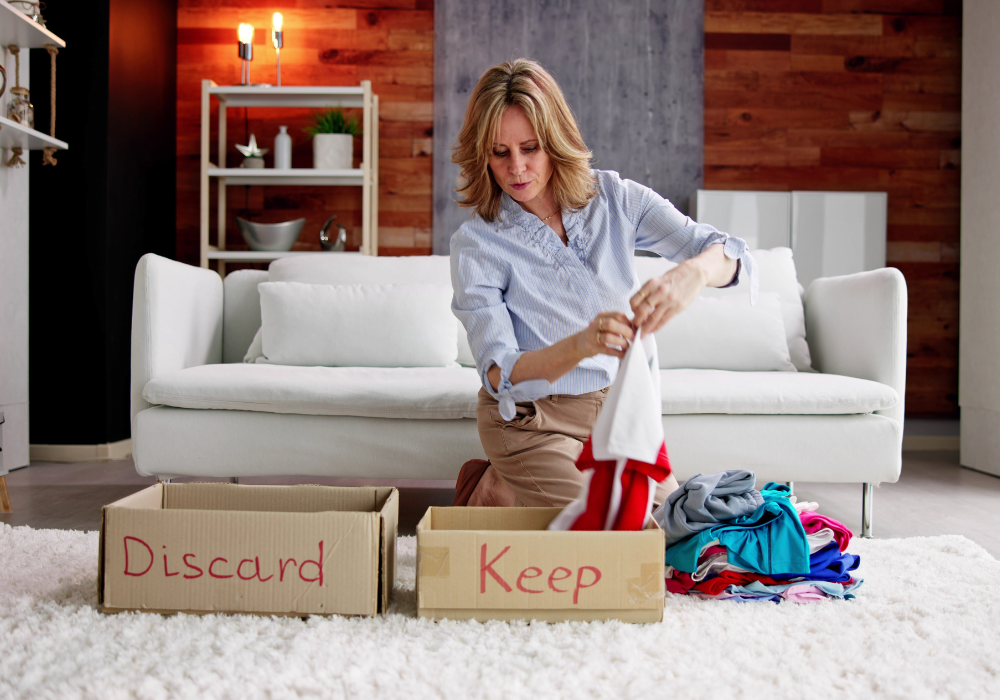One wrong move could cost you comfort, money, and peace of mind—don’t downsize until you read this.

Downsizing sounds simple at first glance, but it’s a complex and emotional journey that can easily unravel if you’re not careful. Letting go of a lifetime’s worth of possessions is never as easy as it sounds, and one wrong decision can spiral into unexpected discomfort, wasted money, and lasting regret. The process requires far more planning, self-awareness, and emotional resilience than most people realize at the start.
Instead of rushing into what should be a fresh new chapter of life, take a moment to understand the hidden risks. With some foresight and preparation, you can navigate the pitfalls that catch so many off guard. Here’s your guide to the 14 biggest downsizing mistakes seniors make—and how to avoid them so your transition is smooth, satisfying, and genuinely joyful.
1. Thinking “I’ll Just Handle It Myself” Could Be Your Biggest Mistake

Downsizing might seem like a personal project you can manage on your own, but it quickly becomes overwhelming without proper support. The sheer volume of decisions to make—from what to keep, sell, donate, or toss—can be mentally and physically exhausting, especially when emotional attachments start surfacing, writers at Songbird Transitions mentioned.
Instead of carrying the burden alone, consider bringing in trusted family members, hiring a professional downsizer, or even working with a moving coordinator. These resources not only lighten your load but also help you stay organized and less stressed. What feels like a mountain today can be made manageable with the right hands by your side.
2. Skipping the Planning Phase Can Lead to Major Regrets

It’s tempting to dive right into packing boxes, but without a solid plan, you’ll soon find yourself surrounded by chaos. Failing to plan can result in poor decisions, overlooked essentials, and a home that doesn’t feel like the sanctuary you imagined, writers at The Junkluggers mentioned.
Start by creating a downsizing timeline that outlines when and how you’ll tackle each task. Think through room layouts, storage needs, and sentimental priorities ahead of time. With a thoughtful roadmap, you’ll approach each step feeling confident rather than scrambling to fix mistakes later.
3. Holding Onto “Someday” Items Can Drain Your New Space

The idea that you might need something “someday” is powerful—and often misleading. Those unused craft supplies, outdated furniture, and stacks of books are easy to justify keeping but become burdens once you’re living in a smaller space, writers at City National Bank Reported.
Letting go requires honest self-reflection. Ask yourself if each item truly serves your life now, not just a fantasy version of the future. By clearing out what no longer aligns with who you are today, you create room to fully enjoy your new, simplified home without feeling weighed down by “what-ifs.”
4. Forgetting to Measure Your New Space Will Cost You Big

Imagining how your favorite recliner or cherished hutch will fit into your new home is one thing—seeing it jammed into a too-small corner is another. Without accurate measurements, you risk costly mistakes and awkward compromises that take the joy out of your move.
Measure not only the rooms themselves but also doorways, stairwells, and hallways. Create scaled diagrams if needed to envision how your belongings will fit. A few hours spent measuring and planning now can save you thousands in replacement costs and endless frustration down the road.
5. Not Digitizing Important Documents Could Lead to Chaos

Paper clutter builds up faster than you think, and in a smaller living space, filing cabinets and piles of paperwork become unmanageable. Important records, medical documents, and family mementos can easily get lost or damaged if you don’t have a system in place.
Digitizing these essentials ensures they are protected, accessible, and easy to organize. Invest in a good scanner, back everything up to secure cloud storage, and label your files clearly. You’ll breathe easier knowing that even in an emergency, your most critical information is right at your fingertips.
6. Tossing Sentimental Items Without Thought Can Lead to Heartache

The urge to be ruthless when decluttering is understandable, but rushing through sentimental possessions can lead to deep regrets later. Items connected to your personal history deserve time, reflection, and care as you decide what to keep or pass on.
Instead of forcing yourself to get rid of everything quickly, create a “maybe” box for items you’re unsure about. Give yourself permission to revisit them after the main move is complete. Sometimes a little distance offers the clarity you need to decide what’s truly worth preserving.
7. Ignoring Storage Solutions Will Leave You Struggling with Clutter

Assuming that less space automatically means less clutter is a mistake many people make when downsizing. Without smart storage solutions, even a few misplaced items can make your new home feel messy and uncomfortable.
Plan ahead by researching and investing in multi-functional furniture, vertical shelving, and hidden storage options. Think creatively about every nook and cranny—from under beds to behind doors—to make the most of your space. Clever storage not only keeps things tidy but also helps your home feel more spacious and peaceful.
8. Neglecting to Keep Essentials Can Lead to Last-Minute Scrambling

In the whirlwind of moving, it’s easy to accidentally pack away—or even donate—things you’ll need immediately. Not having easy access to medications, important paperwork, or daily comforts can turn your first days in your new place into a frustrating mess.
Prevent this chaos by packing a special “essentials box” with everything you’ll need for the first week. Include toiletries, clothes, chargers, documents, and a few comfort items like your favorite mug. This simple step creates a smoother landing as you settle into your new home.
9. Thinking It All Has to Go at Once Will Just Overwhelm You

The idea of clearing out a lifetime’s worth of belongings all at once can feel like an impossible mountain to climb. Trying to do too much, too fast leads to emotional exhaustion and can make the entire process feel overwhelming and defeating.
Give yourself the gift of time. Break downsizing into manageable stages, focusing on one small area at a time. Celebrate each milestone, no matter how small. Progress builds momentum, and you’ll find that by going slowly, you’re better able to make thoughtful decisions rather than rushing into ones you might regret.
10. Overlooking Safety Can Make Downsizing Dangerous

It’s easy to overlook just how physical the downsizing process can be until you’re mid-move, lifting heavy boxes and climbing over piles. Without proper precautions, it’s far too easy to trip, fall, or strain yourself.
Prioritize your safety by wearing sturdy shoes with good grip, keeping walkways clear, and asking for help with anything heavy or awkward to lift. If needed, hire professional movers for the bigger items. Staying safe ensures that downsizing marks the beginning of an exciting new chapter, not an avoidable setback.
11. Assuming Your Family Wants Your Belongings Might Create Tension

It’s natural to assume your loved ones will want your treasured items, but tastes, lifestyles, and needs have changed. What holds deep meaning for you may not carry the same emotional weight for them, and forcing items onto family can create resentment or guilt.
Have open conversations instead of making assumptions. Offer cherished items freely and graciously accept when someone declines. By letting your family choose for themselves, you ensure that your possessions go to homes where they’ll be truly valued and appreciated.
12. Rushing Through Downsizing Can Lead to Mistakes You’ll Regret

Trying to “just get it over with” often leads to thoughtless decisions and heartbreak down the line. Important keepsakes may be discarded in haste, or practical necessities may be forgotten entirely.
Take your time and approach downsizing as a process of honoring your past while preparing for your future. By slowing down and reflecting on each item’s role in your life, you can create a future living space that feels not just organized but deeply personal and meaningful.
13. Forgetting About Emotional Support Can Leave You Feeling Alone

Downsizing isn’t just a physical task; it’s a deeply emotional journey that can stir up memories, loss, and even grief. Trying to navigate it all alone can leave you feeling isolated and vulnerable during an already challenging time.
Reach out to those you trust, whether that’s family, friends, or a support group. Share your experiences and emotions openly. Having someone listen and offer encouragement can make all the difference, turning downsizing from a lonely chore into a supported and empowering transformation.
14. Not Celebrating Your New Chapter Leaves You Missing Out on Joy

After all the hard work of sorting, purging, and moving, it’s easy to just collapse into your new space without fanfare. But downsizing isn’t just about losing things—it’s about gaining freedom, clarity, and new beginnings.
Take time to celebrate your accomplishment. Host a small housewarming, decorate your space with things that make you smile, and mark this new chapter with pride. You’ve earned the right to enjoy every moment of this transition—and to see it as a bold step toward living life on your own terms.
